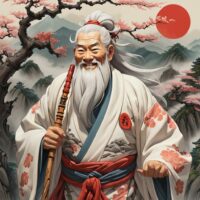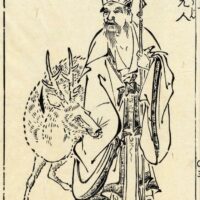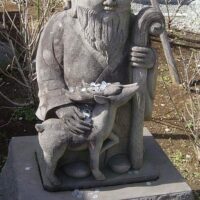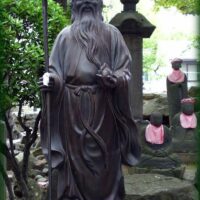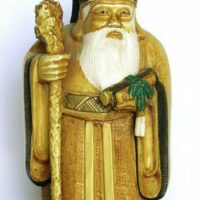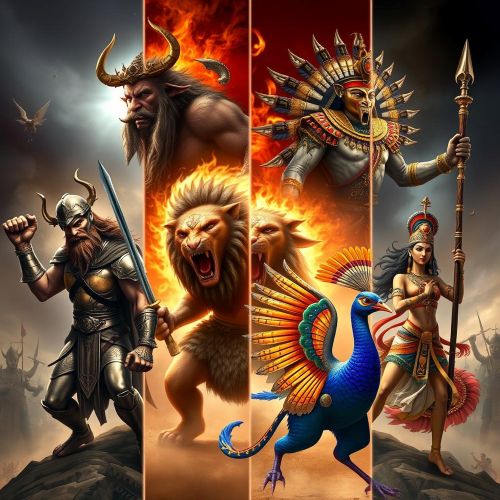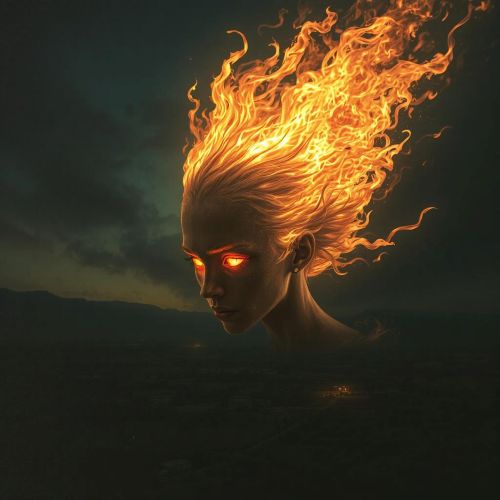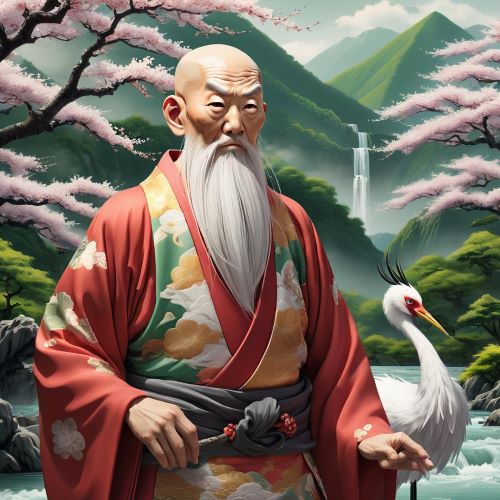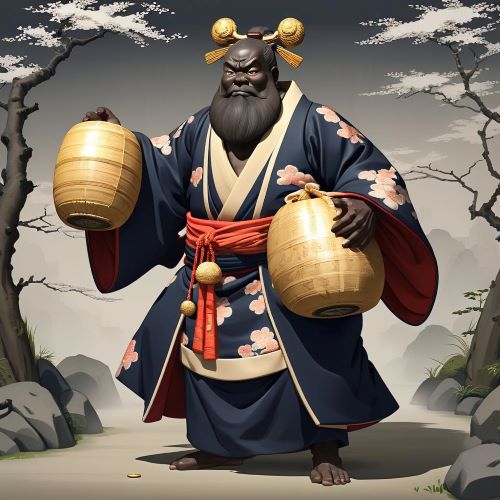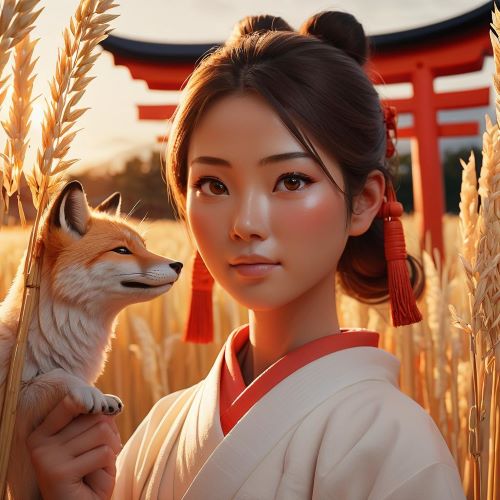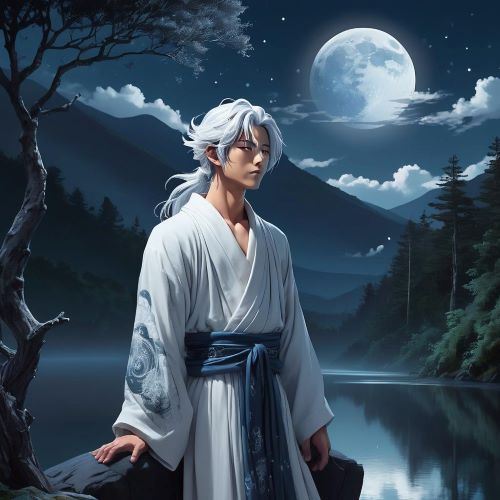Jurojin : God of Longevity
Listen
At a glance
| Description | |
|---|---|
| Origin | Japanese Mythology |
| Classification | Gods |
| Family Members | N/A |
| Region | Japan |
| Associated With | Longevity, Health, Happiness, Wisdom |
Jurojin
Introduction
Jurojin, one of the Seven Lucky Gods (Shichifukujin) in Japanese mythology, is the deity of longevity, happiness, and wisdom. His origins trace back to Chinese Taoism, where he parallels the Chinese god of longevity, Shou Lao. Jurojin’s incorporation into Japanese folklore during the Heian period (794-1185) highlights the cultural exchange between China and Japan. Today, Jurojin remains a beloved figure, symbolizing long life and prosperity, and is often associated with the well-being of the elderly. He is also believed to be an incarnation of the Southern Pole Star, embodying the celestial aspect of existence. His presence continues to be celebrated in various festivals and art forms throughout Japan.
Physical Traits
Jurojin, one of the Seven Lucky Gods in Japanese mythology, is often depicted as an elderly man with a long white beard, symbolizing wisdom and longevity. His kindly expression and high, rounded forehead emphasize his age and knowledge. Typically wearing the robes of a Taoist sage, Jurojin embodies a mystical and scholarly nature. A prominent feature in Jurojin’s imagery is his staff, often adorned with a scroll believed to contain all the wisdom of the world, including the lifespan of every living being. He is frequently shown accompanied by a deer, a symbol of longevity in East Asian cultures, and sometimes with other animals like cranes or tortoises, traditional emblems of long life.
His short stature, usually depicted as less than three shaku (approximately 90 centimeters), highlights his wizened appearance. Some portrayals include a bald head or long white hair, both common symbols of wisdom. Jurojin’s meticulously maintained, long flowing beard represents the passage of time and accumulated knowledge. His narrowed eyes twinkle with wisdom and amusement. Jurojin’s attire, often a flowing robe sometimes adorned with intricate patterns, reflects his scholarly pursuits. A scholar’s cap, known as a “kanmuri,” often tops his head, emphasizing his association with wisdom and learning.
Family
Jurojin’s origins blend Chinese Taoist beliefs with Japanese Buddhist influences, possibly inspired by the “Old Man of the South Pole” or a figure from China’s Northern Song dynasty. Taoist concepts of longevity heavily influenced his depiction, sometimes identifying him as the Southern Polar Star, symbolizing constancy. He shares a connection with Fukurokuju, another deity of longevity among the Seven Lucky Gods, with whom he’s occasionally conflated. This blurring of identities underscores their shared symbolism and spiritual kinship within the pantheon.
In Japanese mythology, Jurojin is part of the Seven Lucky Gods, revered collectively for their blessings. While his direct family lineage isn’t detailed in mythological texts, his association with Fukurokuju suggests a spiritual familial bond based on their similar attributes and domains. Jurojin himself is celebrated for his focus on longevity and well-being, contributing to the overall prosperity and happiness symbolized by the Seven Lucky Gods.
Other names
Jurojin is known by various names and titles that reflect his attributes and origins. Derived from Chinese Taoist traditions, one of his alternative names is Gama, associated with the Daoist immortal Chang’e and emphasizing his roots in Chinese mythology. Another title, the “Old Man of the South Pole” (南極老人, Nankyoku Rōjin), connects him to the star Canopus, significant for longevity in East Asian astrology, elevating his divine status beyond earthly realms.
The name “Jurojin” itself carries significant meaning, with “Juro” meaning “longevity” or “long-lived,” and “jin” meaning “old man,” perfectly encapsulating his essence. In different regions of Japan, he is also known by names such as Gentoku (meaning “eternal virtue”), Hokuto Shonin (meaning “Hermit of the North Star”), and Nankyokusenjin (meaning “God of the South Polar Star”). These names underscore his presence in both Japanese and Chinese mythologies, highlighting his cross-cultural significance.
Powers and Abilities
Jurojin’s powers are intricately tied to his role as the god of longevity, offering believers blessings of extended life, good health, and wisdom. His staff or scroll, often depicted as containing the lifespans of all living beings, symbolizes the pathway to virtuous living and a fulfilling existence. In some interpretations, the scroll transforms into a Buddhist sutra, guiding adherents towards a life of virtue and longevity. Beyond longevity, Jurojin is associated with prosperity and fortune, believed to bring wealth and abundance to those who venerate him. While less common than his staff and scroll, he is occasionally depicted with a fan, said to grant wishes or confer immortality on the deserving.
Jurojin is portrayed as a benevolent deity, using his powers for guidance rather than harm, emphasizing the pursuit of longevity and virtue. His connection to the deer, symbolizing endurance and protection from malevolent forces, further enhances his role as a guardian of well-being and harmony. Additionally, his scholarly appearance and association with a scroll signify his role as a patron of wisdom and learning, sought after by those aspiring to intellectual enlightenment. In prayers and rituals, followers invoke Jurojin not only for longevity and health but also for profound wisdom and understanding, seeking a life enriched by knowledge and spiritual growth.
Modern Day Influence
Jurojin remains a significant cultural figure in contemporary Japan, particularly during New Year celebrations honoring the Seven Lucky Gods. His statues and images are prevalent in homes, temples, and public spaces, serving as reminders of the values he embodies, especially longevity. Elderly individuals often pray to Jurojin for health and a peaceful old age, reflecting his enduring appeal among different generations.
In popular culture, Jurojin appears across various media platforms like anime, manga, and video games, typically portrayed as a wise elder imparting crucial knowledge to younger characters. This portrayal not only preserves his mythological legacy but also connects ancient beliefs with modern storytelling.
Moreover, Jurojin’s symbolism extends into daily life through traditional Japanese arts such as paintings and ceramics, where his image is depicted to symbolize health and well-being. Additionally, his likeness is sometimes used in branding for products promoting health and longevity, further cementing his cultural relevance. Overall, Jurojin’s continued reverence underscores Japan’s deep cultural appreciation for ideals such as longevity, wisdom, and the harmonious balance of life, making him a revered and enduring presence in both traditional mythology and contemporary society.
Related Images
Frequently Asked Questions
What is lorem Ipsum?
I am text block. Click edit button to change this text. Lorem ipsum dolor sit amet, consectetur adipiscing elit. Ut elit tellus, luctus nec ullamcorper mattis, pulvinar dapibus leo.
What is lorem Ipsum?
I am text block. Click edit button to change this text. Lorem ipsum dolor sit amet, consectetur adipiscing elit. Ut elit tellus, luctus nec ullamcorper mattis, pulvinar dapibus leo.
What is lorem Ipsum?
I am text block. Click edit button to change this text. Lorem ipsum dolor sit amet, consectetur adipiscing elit. Ut elit tellus, luctus nec ullamcorper mattis, pulvinar dapibus leo.
What is lorem Ipsum?
I am text block. Click edit button to change this text. Lorem ipsum dolor sit amet, consectetur adipiscing elit. Ut elit tellus, luctus nec ullamcorper mattis, pulvinar dapibus leo.
What is lorem Ipsum?
I am text block. Click edit button to change this text. Lorem ipsum dolor sit amet, consectetur adipiscing elit. Ut elit tellus, luctus nec ullamcorper mattis, pulvinar dapibus leo.

